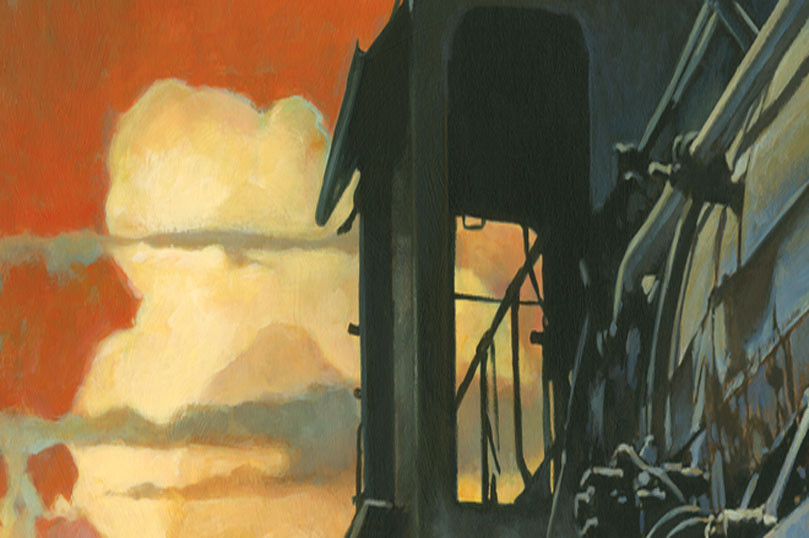 U.S. Deputy Page Murdock is ordered to Cape Hell, Mexico, to verify a report that former Confederate Captain Oscar Childress is raising an army to take over Mexico City–and then intends to turn north to rekindle the Civil War.
U.S. Deputy Page Murdock is ordered to Cape Hell, Mexico, to verify a report that former Confederate Captain Oscar Childress is raising an army to take over Mexico City–and then intends to turn north to rekindle the Civil War.
With only Hector Cansado, an engineer who can’t be trusted and Joseph, a Native American fireman with a few secrets of his own, Murdock hurtles through the murderous desert of a foreign land toward a man bent on wholesale massacre . . . unless Murdock can stop him. Enjoy an excerpt from Cape Hell by Loren D. Estleman, coming out May 10. Already read chapter one? Criminal Element has chapters two and three!
CHAPTER ONE
Halfway back to civilization, Lefty Dugan began to smell.
It was my own fault, partly; I’d stopped on the north bank of the Milk River like some tenderheel fresh out of Boston instead of crossing and pitching camp on the other side. I was worn down to my ankles, and the sorry buckskin I was riding sprouted roots on the spot and refused to swim. The pack horse was game enough; either that, or it was too old to care if it was lugging a dead man or a month’s worth of Arbuckle’s. But it couldn’t carry two, especially when one was as limp as a sack of stove-bolts and just as heavy. I was getting on myself and in no mood to argue, so I unpacked my bedroll.
A gully-washer square out of Genesis soaked my slicker clear through and swelled the river overnight. I rode three days upstream before I found a place to ford, by which time even the plucky pack horse was breathing through its mouth. In Chinook I hired a buckboard and put in to the mercantile for salt to pack the carcass, but the pirate who owned the store mistook me for Vanderbilt, and then the Swede who ran the livery refused to refund the deposit I’d made on the wagon. So I buried Lefty in the shadow of the Bearpaws and rode away from five hundred cartwheel dollars on a mount I should have shot and left to feed what the locals call Montana swallows: magpies, buzzards, and carrion crows.
The thing was, I’d liked Lefty. We’d ridden together for Ford Harper before herding cattle lost its charm, and he was always good for the latest joke from the bawdy houses in St. Louis; back then he wasn’t Lefty, just plain Tom. Then he took a part-time job in the off-season blasting a tunnel through the Bitterroots for the Northern Pacific, and incidentally two fingers off his right hand.
Drunk, he was a different man. He’d had a bellyful of Old Rocking Chair when he stuck up a mail train outside Butte and was still on the same extended drunk when he drew down on me not six miles away from the spot. I aimed low, but the fool fell on his face and took the slug through the top of his skull.
Making friends has seldom worked to my advantage. They always seem to wind up on the other side of my best interests.
It was a filthy shame. Judge Blackthorne had a rule against letting his deputies claim rewards—something about keeping the body count inside respectable limits—but made an exception in some cases in return for past loyalty and present reliability, and I was one. It served me right for not allowing for Lefty’s unsteady condition when I tried for his kneecap instead of his hat rack. The money was the same, vertical or horizontal.
To cut my losses, I lopped off his mutilated right hand so I could at least claim the pittance the U.S. Marshal’s office paid for delivering fugitives from federal justice. I packed it in my last half-pound of bacon, making do for breakfast with a scrawny prairie hen I shot east of Sulphur Springs. I picked gristle out of my teeth for fifty miles.
The money from Washington would almost cover what I’d spent to feed that bag of hay I was using for transportation. After I sold it back to the rancher I’d bought it from just outside Helena, I was a nickel to the good. I rode the pack horse in town until it rolled over and died. I wished I’d known the beast when it was a two-year-old, and that’s as much good as I’ve ever had to say about anything with four legs that didn’t bark and fetch birds.
I spent the nickel and a lot more in Chicago Joe’s Saloon, picked a fight with the faro dealer—won that one—and another with the city marshal—lost that one—and would have slept out my time in peace if the Judge himself hadn’t come down personally to spring me.
“You’d better still be alive,” he greeted me from the other side of the bars. “This establishment doesn’t give refunds for bailing out damaged goods.”
I pushed back my hat to take him in. He had on his judicial robes, but the sober official black only heightened his resemblance to Lucifer in a children’s book illustration. I think he tacked the tearsheet up beside his shaving mirror so he could get the chin-whiskers just right. His dentures were in place. They’d been carved from the keyboard of a piano abandoned along the Oregon Trail, and he wore the uncomfortable things only when required by the dignity of the office. It was unlike him to go anywhere straight from session without stopping to change, especially the hoosegow. I was in for either a promotion or the sack.
“How’s Ed?” I asked. The city marshal’s name was Edgar Whitsunday, but only part of his first name ever made it off the door of his office. He’d been named after a dead poet, but being illiterate he sloughed off the accusation whenever it arose. He was a Pentecostal, and amused his acquaintances with his imperfect memorization of Scripture as drilled into him by a spinster aunt: I think my favorite was “I am the excrement of the Lord.”
“He’s two teeth short of a full house,” Blackthorne said. “I told his dentist to bill Grover Cleveland.”
“That’s extravagant. What did you do with the rest of the piano?”
He scowled. The Judge had a sense of his own humor, but no one else’s. “You realize I could declare court in session right here and find you in contempt.”
“And what, put me in jail?” I looked at my swollen right hand. “At least I used my fists. Ed took the top off my head with the butt of his ten-gauge.”
“You should be grateful he didn’t use the other end.” He sighed down to his belt buckle; it was fashioned from a medal of valor. Just what he’d done to earn it, I never knew. Even scraping forty years off his hide I couldn’t picture him scaling a stockade or leading a charge up any but Capitol Hill. Probably he’d helped deliver the Democratic vote in Baltimore. “You cost me more trouble than half the men who ride for me. A wise man would let you rot.”
“You make rotting sound bad.” I slid my hat back down over my eyes. “Find somewhere else to distribute your largesse. This ticky cot is the closest thing I’ve had to a hotel bed since I rode out after Lefty.”
“You can’t refuse bail. Marshal Whitsunday needs this cell. The Montana Stock-Growers Association is in town, and you know as well as I those carpetbaggers will drink the place dry and shoot it to pieces.”
“Good. I was getting lonesome.”
“Shake a leg, Deputy. You’re needed.”
That made me sit up and push back my hat. He wouldn’t admit needing a drink of water in the desert.
He said, “I’m short-handed. Jack Sweeney, your immediate superior, went over my head to Washington and commandeered all my best men to bring the rest of Sitting Bull’s band back from Canada to face justice for Custer.”
“They gave that bloody dandy justice at the Little Big Horn nine years ago. What’s the rush?”
“Sweeney’s contract runs out in September, and there’s a Democrat in the White House.” He held up a key ring the size of Tom Thumb’s head and stuck one in the lock. “Go back to your hotel, clean up, and report to my chambers at six sharp.”
“Since when do you adjourn before dark?”
“I swung the gavel on the Bohannen Brothers at four. You’ve got forty-five minutes to clean up and shave. You look like the Wild Man of Borneo and smell like a pile of uncured hides.”
“How’d you convict the Bohannens without my testimony? I brought them in.”
“They tried to break jail and killed the captain of the guard. That bought them fifty feet of good North Carolina hemp without your help.”
“Bill Greene’s dead?”
“I’m sorry. I didn’t know you were close.”
“He owed me ten dollars on the Fitzgerald fight. I don’t guess he mentioned me in his will.”
His big silver watch popped open and snapped shut. “Forty-four minutes. If I catch so much as a whiff of stallion sweat in my chambers, I’ll fine you twenty-five dollars for contempt of court.”
“Collect it from the stallion.”
“That’s twenty-five dollars you owe the United States.”
I swung my feet to the floor, stood, wrestled for balance, and found it with my fists around the bars. “What’s so urgent? Did we declare war on Mexico again?”
He looked as grim as ever he had during damning evidence. “What have you heard?”
Copyright © 2016 by Loren D. Estleman
Want to keep reading? Visit Criminal Element for chapters two and three.
Pre-order Cape Hell today: Amazon | Barnes & Noble | Books-a-Million | iBooks | Indiebound | Powell’s






